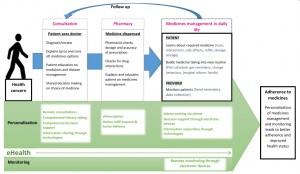Globally, healthcare systems face major challenges with medicines management and medication adherence. Medication adherence determines medication effectiveness and can be the single most effective intervention for improving health outcomes. In anticipation of growth in eHealth interventions worldwide, we explore the role of eHealth in the patients’ medicines management journey in primary care, focusing on personalisation and intelligent monitoring for greater adherence.
eHealth offers opportunities to transform every step of the patient’s medicines management journey. From booking appointments, consultation with a healthcare professional, decision-making, medication dispensing, carer support, information acquisition and monitoring, to learning about medicines and their management in daily life. It has the potential to support personalisation and monitoring and thus lead to better adherence. For some of these dimensions, such as supporting decision-making and providing reminders and prompts, evidence is stronger, but for many others more rigorous research is urgently needed.
Given the potential benefits and barriers to eHealth in medicines management, a fine balance needs to be established between evidence-based integration of technologies and constructive experimentation that could lead to a game-changing breakthrough. A concerted, transdisciplinary approach adapted to different contexts, including low- and middle-income contries is required to realise the benefits of eHealth at scale.

